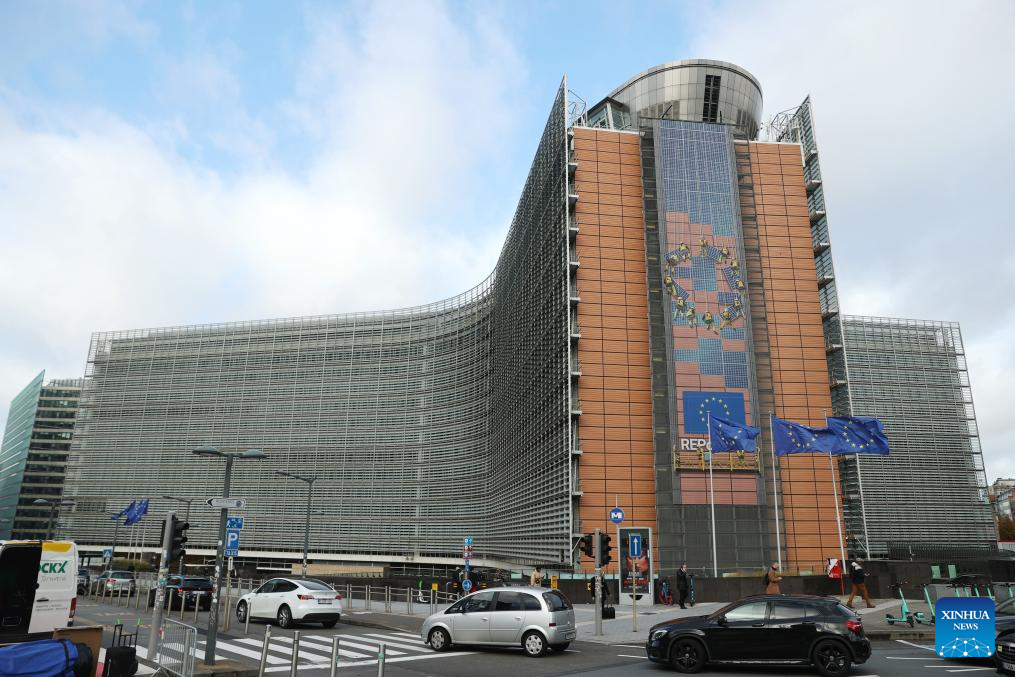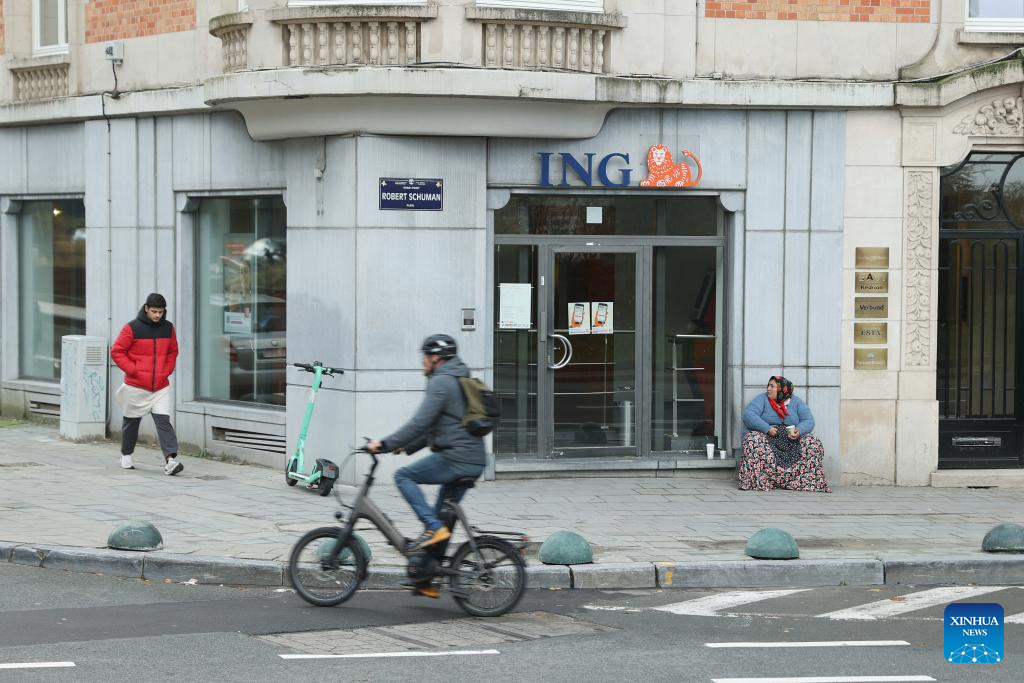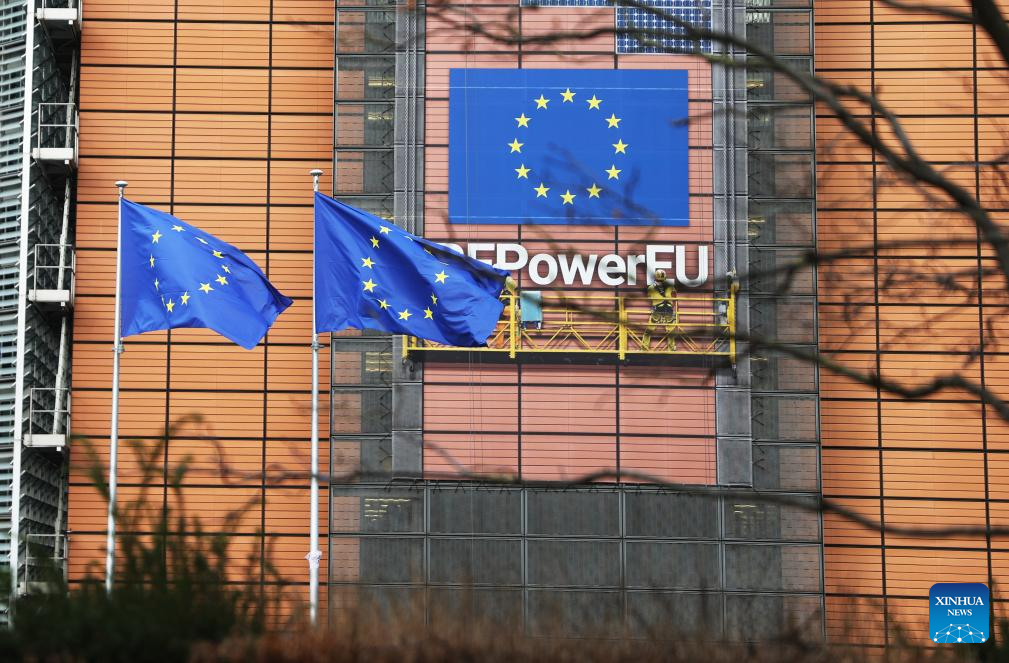
This photo taken on Nov. 15, 2023 shows the European Commission building in Brussels, Belgium.
The European Union (EU) economy lost momentum in 2023, according to the European Commission's Autumn Economic Forecast published here on Wednesday.
The Commission has downgraded its forecast for economic growth in both the EU and the eurozone this year to 0.6 percent from the previously projected 0.8 percent. (Xinhua/Zhao Dingzhe)
BRUSSELS, Nov. 15 (Xinhua) -- The European Union's (EU) economy lost momentum in 2023, according to the European Commission's Autumn Economic Forecast published here on Wednesday.
The Commission has downgraded its forecast for economic growth in both the EU and the eurozone this year to 0.6 percent from the previously projected 0.8 percent.
The Commission said that real gross domestic product (GDP) in the EU barely grew in the first three quarters of 2023. High inflation, though declining from its peak, and tightening monetary policy took a heavier toll than previously expected, alongside weak external demand.
The latest business indicators and survey data for October pointed to subdued economic activity also in the fourth quarter of this year, amid increased uncertainty.
"We are approaching the end of a challenging year for the EU economy. Strong price pressures and the monetary tightening needed to contain them, as well as weak global demand, have taken their toll on households and businesses," European Commissioner for Economy Paolo Gentiloni said.
The EU GDP is projected to increase by 1.3 percent in 2024, 0.1 percentage points below the summer forecast. The eurozone economy is expected to grow 1.2 percent next year. For 2025, the Commission projected 1.7 percent growth for the EU and 1.6 percent for the eurozone.
According to the autumn forecast, inflation remains on a downward trend. Headline inflation in the eurozone is projected to fall from 5.6 percent in 2023 to 3.2 percent in 2024, and 2.2 percent in 2025. In the EU, the inflation rate in 2023 should be 6.5 percent, and is projected to decrease to 3.5 percent in 2024, and to 2.4 percent in 2025.
The decline in inflation can largely be attributed to the fall in energy prices. Moreover, such moderation has now spread to all main consumption categories beyond energy and food, according to the Commission. Inflation is set to continue decreasing due to monetary tightening, although more moderately.
Thanks to the phase-out of pandemic-related temporary measures, the reduction in subsidies to private investment and the lower net budgetary impact of energy-related measures, the ratio of public deficit to GDP in the EU is projected to decrease to 3.2 percent this year. Next year, the EU public deficit should drop further to 2.8 percent of GDP, and then 2.7 percent in 2025.
However, the Commission also cited risks to this forecast, which include geopolitical instability in Ukraine and the Middle East, climate change, and a longer than projected adjustment period to the transmission of monetary tightening.
For the first time, the Autumn Economic Forecast covers Bosnia and Herzegovina, Moldova and Ukraine, to which the European Council granted EU candidate status last year. ■

An office of a financial institution is pictured on a street in Brussels, Belgium, on Nov. 15, 2023.
The European Union (EU) economy lost momentum in 2023, according to the European Commission's Autumn Economic Forecast published here on Wednesday.
The Commission has downgraded its forecast for economic growth in both the EU and the eurozone this year to 0.6 percent from the previously projected 0.8 percent. (Xinhua/Zhao Dingzhe)

A customer shops at a supermarket in Brussels, Belgium, Nov. 15, 2023.
The European Union (EU) economy lost momentum in 2023, according to the European Commission's Autumn Economic Forecast published here on Wednesday.
The Commission has downgraded its forecast for economic growth in both the EU and the eurozone this year to 0.6 percent from the previously projected 0.8 percent. (Xinhua/Zhao Dingzhe)

This photo taken on Nov. 15, 2023 shows part of the European Commission building in Brussels, Belgium.
The European Union (EU) economy lost momentum in 2023, according to the European Commission's Autumn Economic Forecast published here on Wednesday.
The Commission has downgraded its forecast for economic growth in both the EU and the eurozone this year to 0.6 percent from the previously projected 0.8 percent. (Xinhua/Zhao Dingzhe)

This photo taken on Nov. 15, 2023 shows part of the European Commission building in Brussels, Belgium.
The European Union (EU) economy lost momentum in 2023, according to the European Commission's Autumn Economic Forecast published here on Wednesday.
The Commission has downgraded its forecast for economic growth in both the EU and the eurozone this year to 0.6 percent from the previously projected 0.8 percent. (Xinhua/Zhao Dingzhe)



